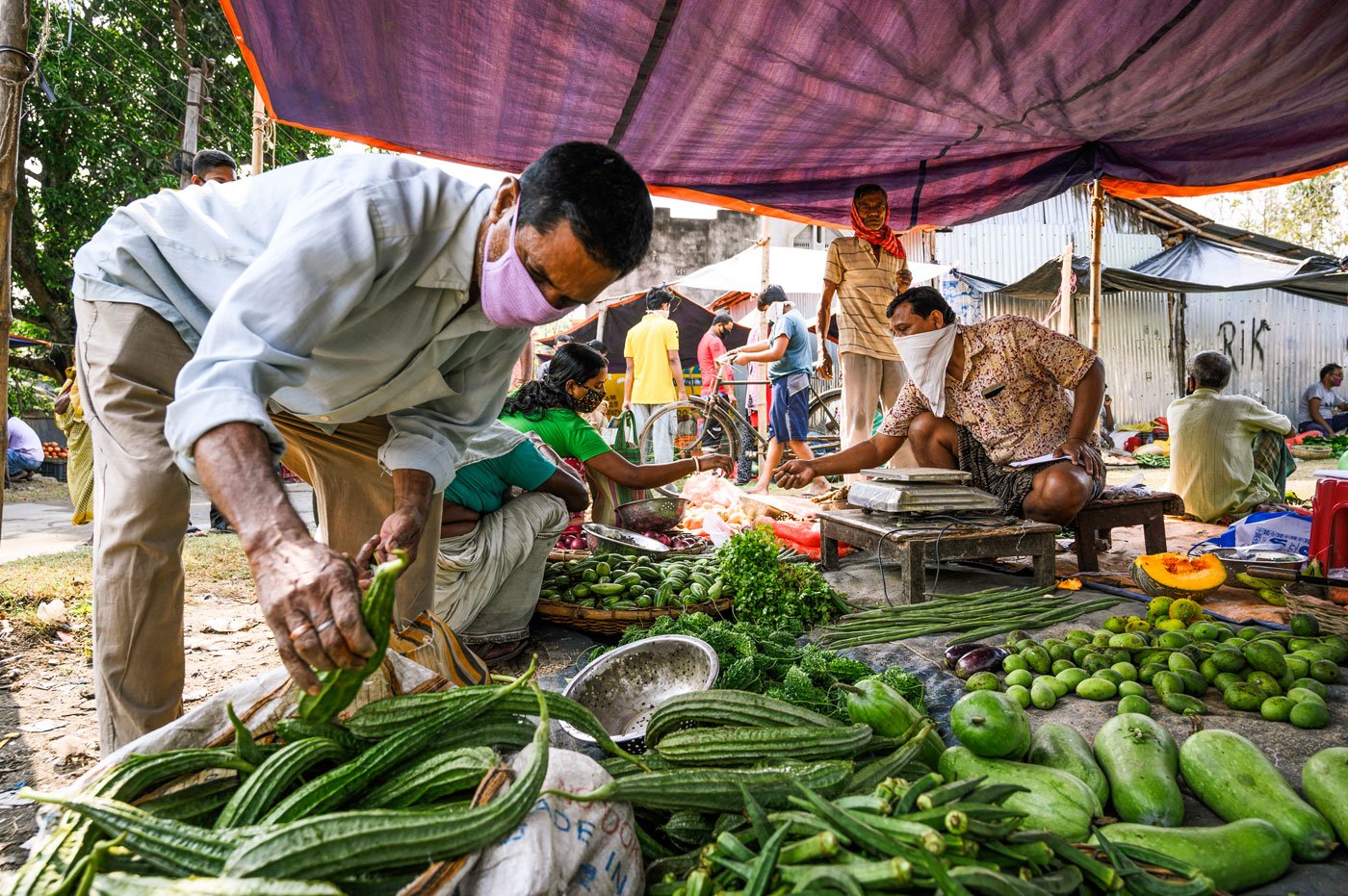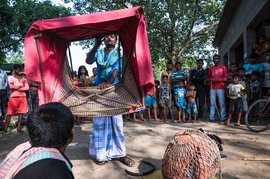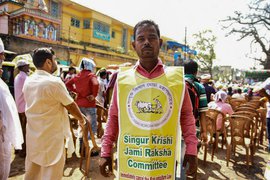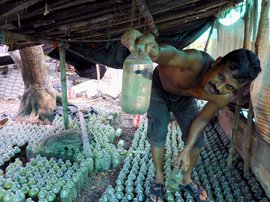କୋଭିଡ୍-୧୯ ଯୋଗୁଁ ପଶ୍ଚିମବଙ୍ଗର ନାଦିଆ ଜିଲ୍ଲାର ତେହତ୍ତା ଗ୍ରାମର ଚାତୋର୍ ପଡାରେ ଦୈନିକ ପରିବା ବଜାର ବନ୍ଦ ହୋଇଯାଇଥିବା ବେଳେ ଏହି ଗ୍ରାମର ଦତ୍ତା ପଡାରେ ଏକ ଅସ୍ଥାୟୀ ବଜାର ତିଆରି କରାଯାଇଛି ଯାହା ପୂର୍ବାହ୍ନ ୬ ଟାରୁ ୧୦ଟା ପର୍ଯ୍ୟନ୍ତ ଖୋଲା ରହୁଛି । ତେହେତ୍ତା ବ୍ଲକ୍ରେ ଅବସ୍ଥିତ ଏହି ଗ୍ରାମକୁ ଏପ୍ରିଲ୍ ମାସରେ ପଶ୍ଚମବଙ୍ଗ ସରକାରଙ୍କ ଦ୍ୱାରା ଏକ ‘ହଟ୍ସ୍ପଟ୍’ ଭାବେ ଚିହ୍ନଟ କରାଯାଇଛି। ବଜାର ଦିନର କିଛି ଚିତ୍ର :
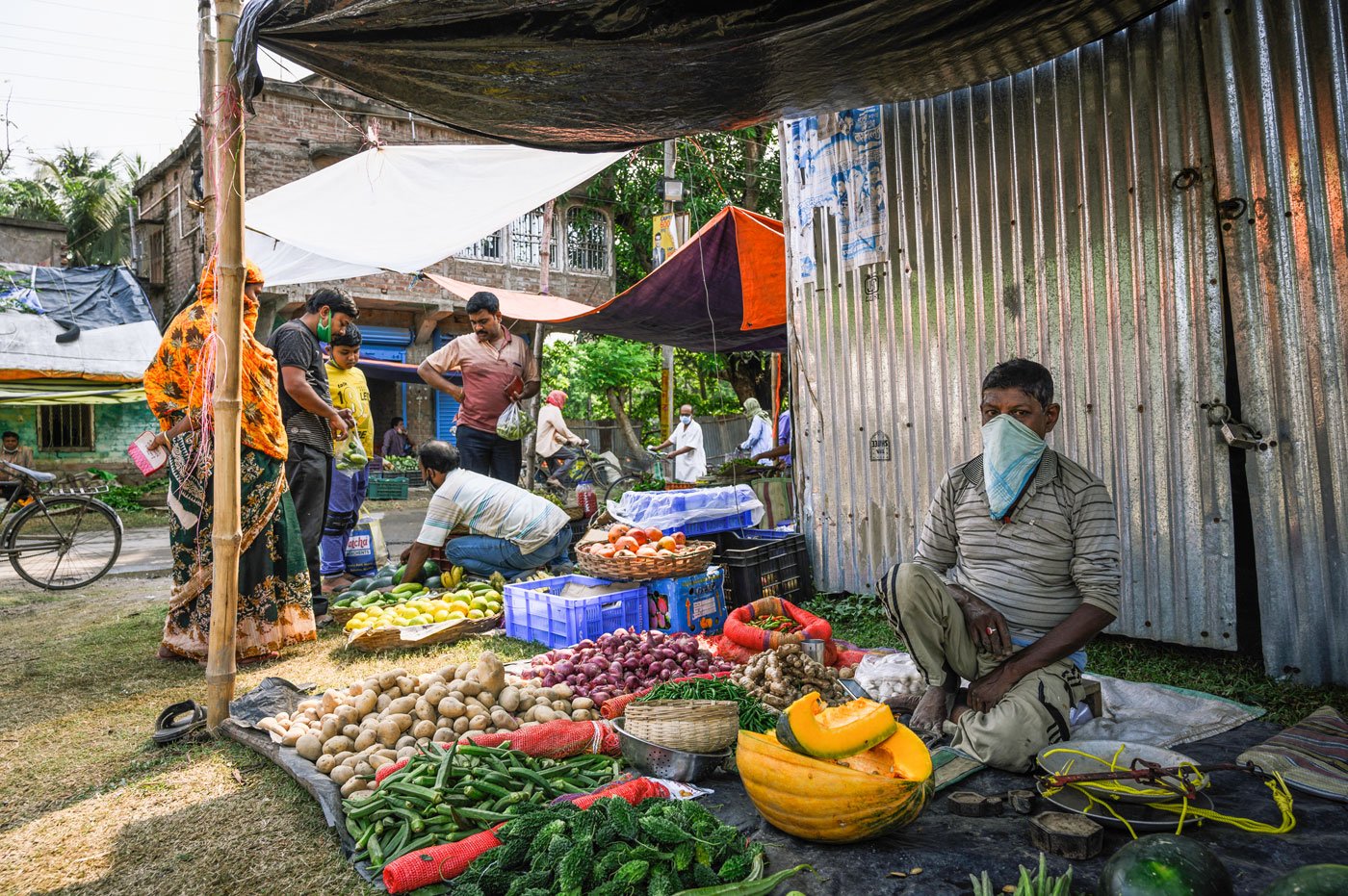
ପ୍ରଶାନ୍ତ ମଣ୍ଡଳ, ୪୮, ସକାଳବେଳେ ଡାଲ୍ – ପୁରି ଓ ସନ୍ଧ୍ୟାବେଳେ ଆଳୁ ବଣ୍ଡା ବିକ୍ରି କରୁଥିଲେ । ହେଲେ, ତାଲାବନ୍ଦ ଯୋଗୁଁ ରାସ୍ତା କଡରେ ବିକ୍ରି ହେଉଥିବା ଖାଦ୍ୟ ଉପରେ ପ୍ରତିବନ୍ଧକ ଲଗାଯିବା ପରେ, ସେ ପନିପରିବା ବିକ୍ରି କରିବାକୁ ଆରମ୍ଭ କଲେ । ପୂର୍ବେ ସେ ଦୈନିକ ୪୦୦ ଟଙ୍କା ଉପାର୍ଜନ କରୁଥିବା ବେଳେ ବର୍ତ୍ତମାନେ ସେ କେବଳ ୧୫୦ ଟଙ୍କା ଉପାର୍ଜନ କରୁଛନ୍ତି । “ମୁଁ ପନିପରିବା ବ୍ୟବସାୟ ବିଷୟରେ ବିଶେଷ କିଛି ଜାଣେନାହିଁ,” ବୋଲି ସେ କୁହନ୍ତି ।
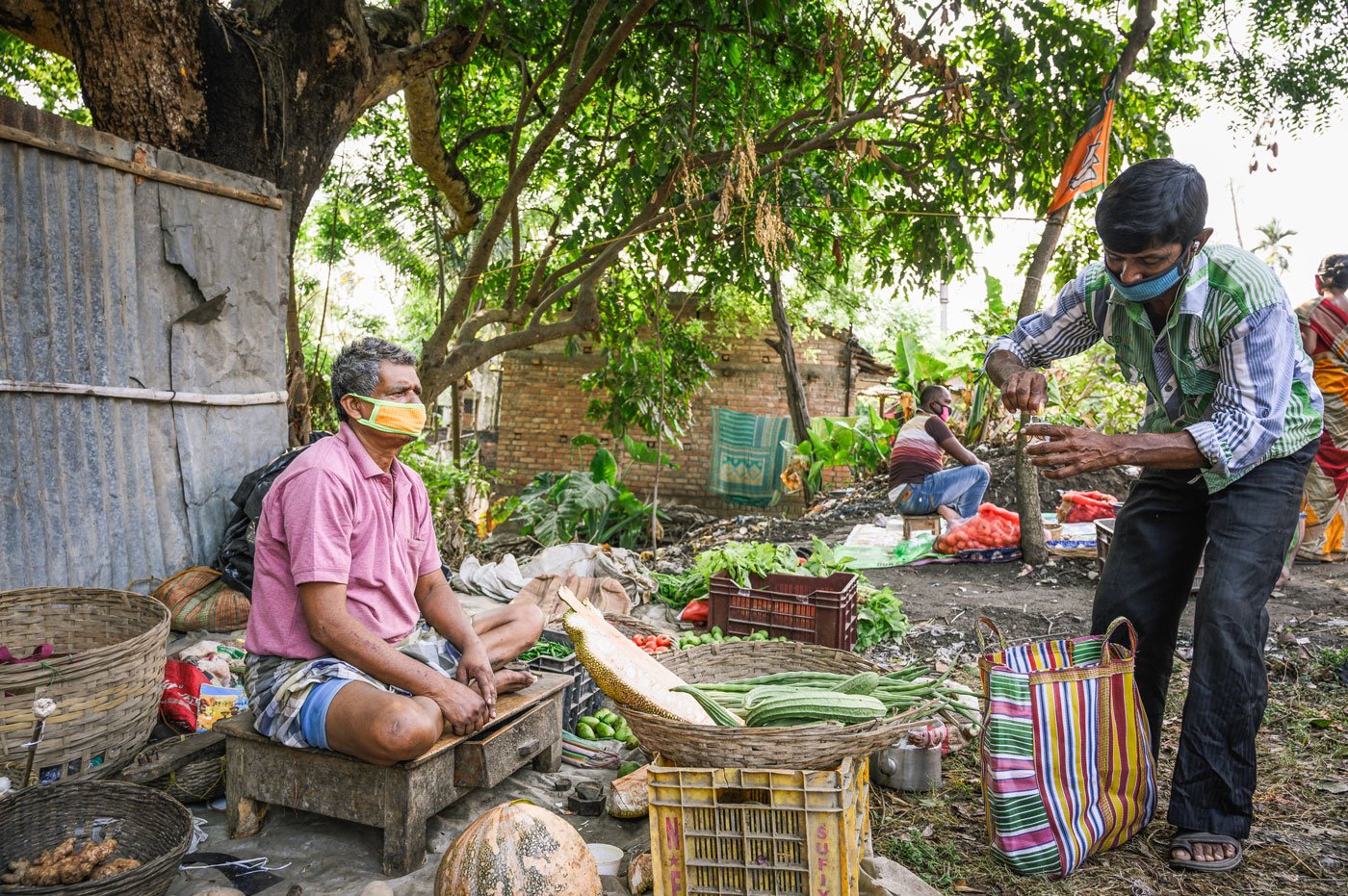
ରାମ ଦତ୍ତ, ଜଣେ ୫୬ ବର୍ଷ ବୟସ୍କ ପରିବା ବିକାଳି, ଶାନ୍ତି ହଲ୍ଦର୍ଙ୍କ ଚାହା ଦୋକାନରୁ ଚା’ କିଣୁଛନ୍ତି । ସେ ଦୈନିକ ୩୦୦ ଟଙ୍କା ଉପାର୍ଜନ କରୁଥିଲେ, ହେଲେ ଏବେ କେବଳ ଏହାର ଅଧା ଉପାର୍ଜନ କରୁଛନ୍ତି । “ପୂର୍ବେ ମୋର ଅଧିକ ବିକ୍ରି ହେଉନଥିଲା, ବର୍ତ୍ତମାନ ସ୍ଥିତି ଆହୁରି ଖରାପ ହୋଇଯାଇଛି,” ବୋଲି ସେ କୁହନ୍ତି । ଶାନ୍ତି ହଲ୍ଦର୍, ୪୮, ଗତ ୨୦ ବର୍ଷ ହେବ ଝାଲ୍ ମୁଢି (ପଶ୍ଚିମବଙ୍ଗର ଏକ ଲୋକପ୍ରିୟ ରାସ୍ତାକଡ ଖାଦ୍ୟ) ବିକନ୍ତି କିନ୍ତୁ ରାସ୍ତାକଡ ଖାଦ୍ୟ ଉପରେ ତାଲାବନ୍ଦ ଯୋଗୁଁ ପ୍ରତିବନ୍ଧକ ଲଗାଯାଇଥିବାରୁ ସେ ଏବେ ଚା’ ବିକୁଛନ୍ତି । ତାଙ୍କର ଦୈନିକ ଉପାର୍ଜନ ମଧ୍ୟ ହ୍ରାସ ପାଇ ୨୫୦- ୩୦୦ରୁ ୧୦୦-୧୨୦ଟଙ୍କା ହୋଇଯାଇଛି ।
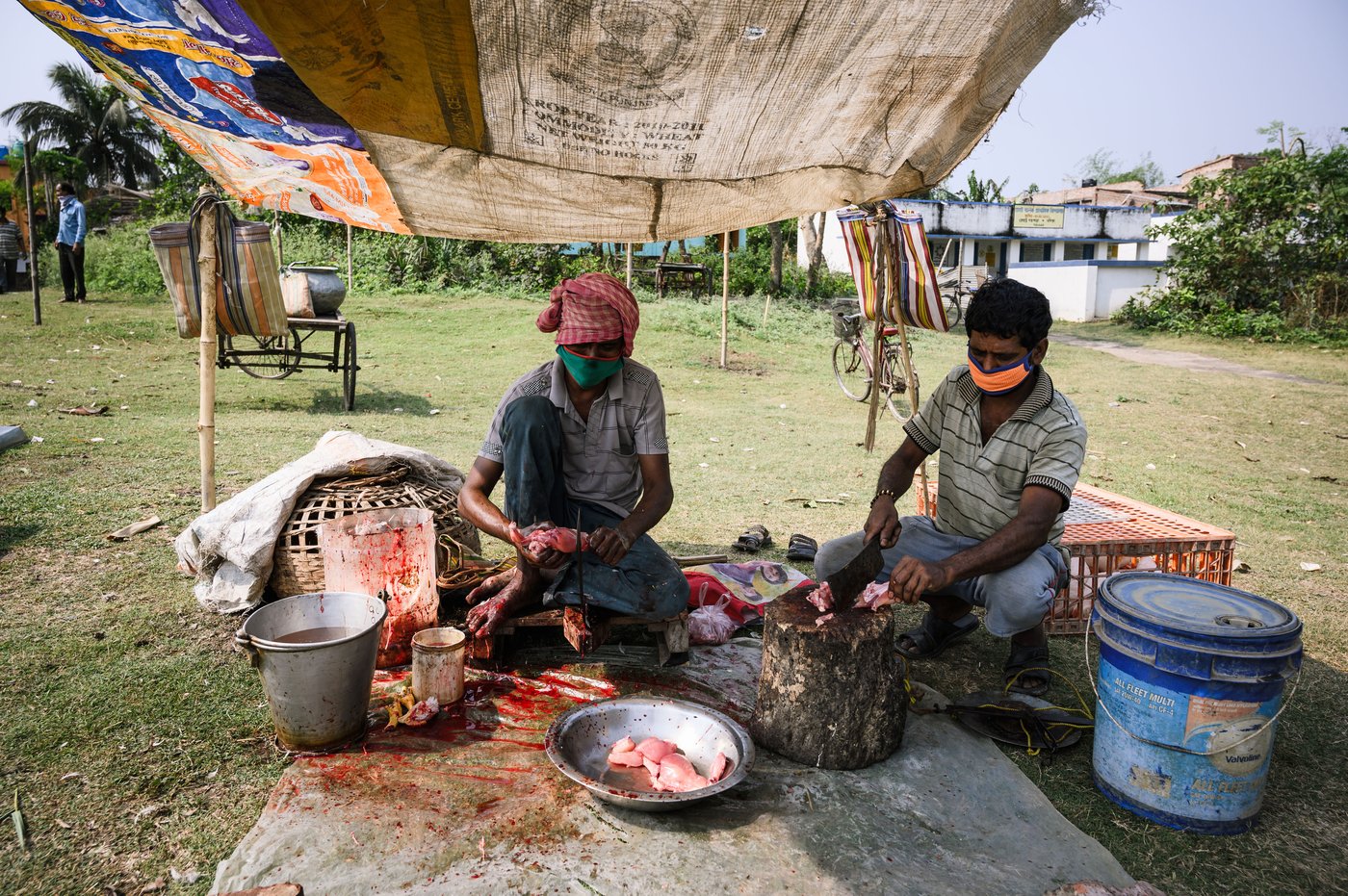
ସୁଖେନ୍ (ବାମ) ଓ ପ୍ରସନ୍ଜିତ ହଲ୍ଦର (ଡାହାଣ) ହେଉଛନ୍ତି ଦୁଇ ଭାଇ । ସୁଖେନ୍ ଏକ ରେଷ୍ଟୁରାଣ୍ଟରେ କାମ କରି ମାସକୁ ୧୦,୦୦୦ଟଙ୍କା ରୋଜଗାର କରୁଥିଲେ କିନ୍ତୁ ବର୍ତ୍ତମାନ ସେ ଅତିକଷ୍ଟରେ ଦିନକୁ ମାତ୍ର ୨୦୦ଟଙ୍କା ରୋଜଗାର କରି ପାରୁଛନ୍ତି ଓ ତାହା ମଧ୍ୟ ନିଶ୍ଚିତ ନୁହେଁ । ପ୍ରସନଜିତ ଏକ ମାଛ ଫାର୍ମରେ କାମ କରୁଥିଲେ ଓ ସେ ମିସ୍ତ୍ରୀମାନଙ୍କ ସହାୟକ ଭାବେ ମଧ୍ୟ ପାର୍ଟ-ଟାଇମ୍ କାମ କରନ୍ତି । ସେ ଅଳ୍ପ ରୋଜଗାର କରନ୍ତି – ଉଭୟ ସ୍ରୋତରୁ ସେ ଦୈନିକ ପ୍ରାୟ ୨୫୦ ଟଙ୍କା ରୋଜଗାର କରନ୍ତି – କିନ୍ତୁ ମାଛ ଫାର୍ମରୁ କିଛି ମାଛ ତାଙ୍କ ଘରକୁ ନେଇ ଯାଆନ୍ତି । ତାହା ମଧ୍ୟ ତାଲାବନ୍ଦ ଯୋଗୁଁ ବନ୍ଦ ହୋଇଯାଇଛି ।
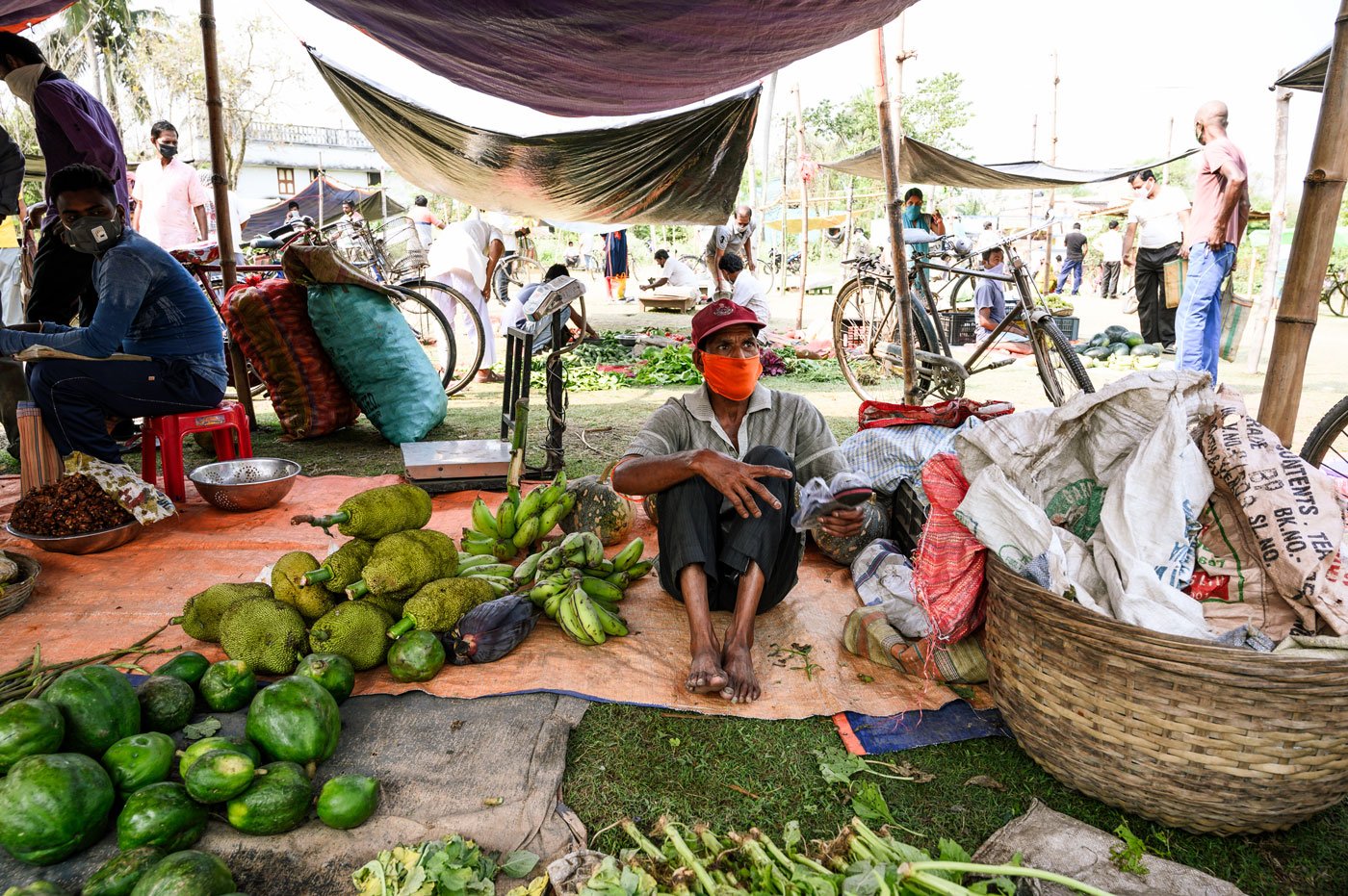
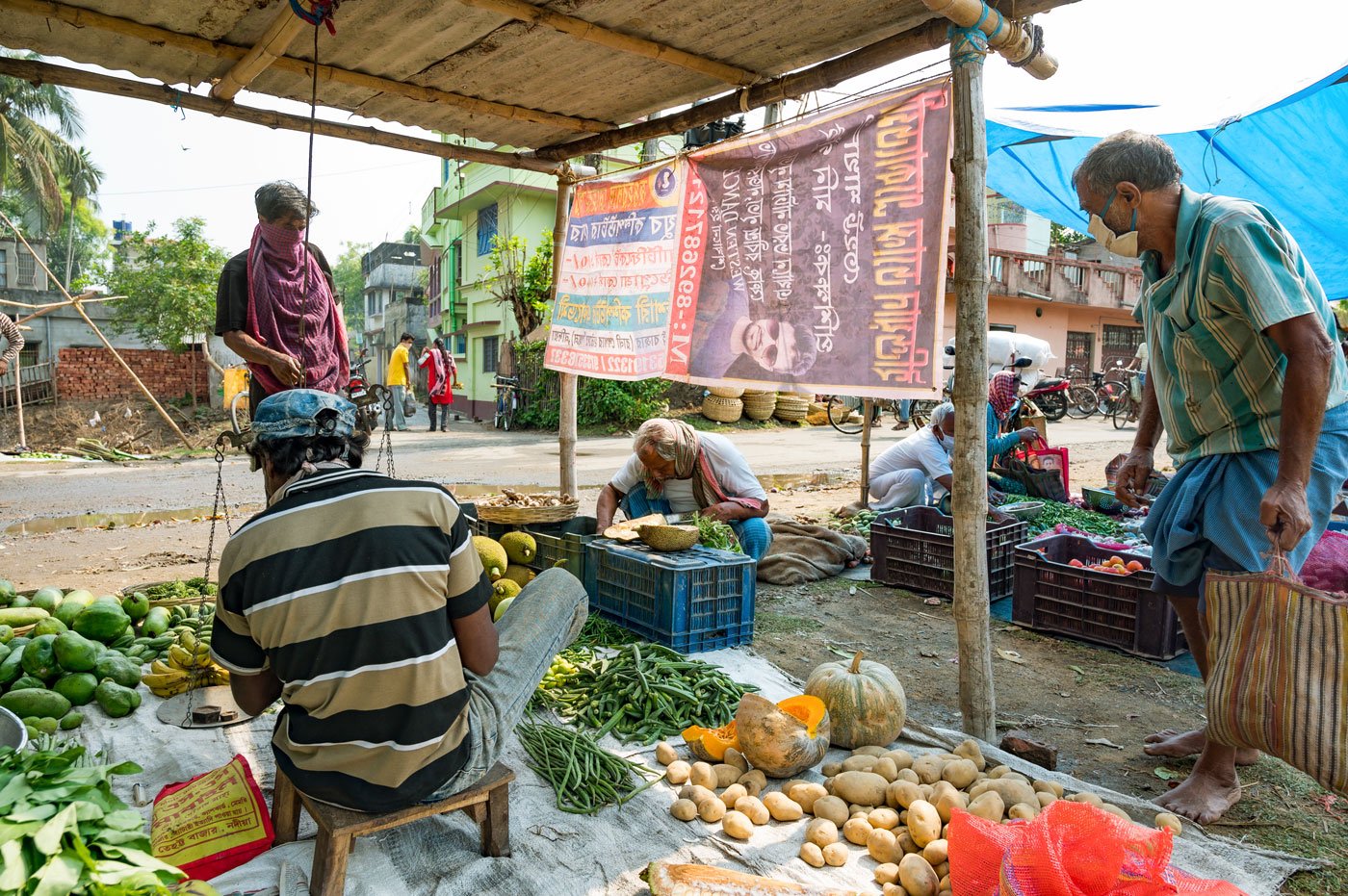
ବାମ: ଗତ ୨୩ ବର୍ଷ ହେବ, ୪୭ ବର୍ଷ ବୟସ୍କ ପ୍ରଫୁଲ ଦେବନାଥ ନିୟମିତ ସମବାୟ କୃଷି ଉନ୍ନୟନ ସମିତି ବଜାରରେ ଛୋଟମୋଟ କାମଧନ୍ଦା କରି ଆସୁଛନ୍ତି (ବର୍ତ୍ତମାନ ତାଲାବନ୍ଦ ପାଇଁ ଏହା ବନ୍ଦ ଅଛି) । ସେ ଗ୍ରାହକମାନଙ୍କ ଘରେ ପହଞ୍ଚାଇବାକୁ ଥିବା ଅଖା ସବୁ ବୁହନ୍ତି ଓ ଗାଡିରୁ ଦୋକାନକୁ ଜିନିଷ ମଧ୍ୟ ବୋହିଥାନ୍ତି । ଆଉ ସେ ପୂରା ମାର୍କେଟ୍ ଝାଡୁ କରନ୍ତି- ଏଥିପାଇଁ ସେ ପ୍ରତ୍ୟେକ ପରିବା ବିକାଳିଙ୍କ ଠାରୁ ୨ଟଙ୍କା ଓ ଅନ୍ୟ ଦୋକାନୀଙ୍କ ଠାରୁ ୧ଟଙ୍କା ନେଇଥାନ୍ତି । ହେଲେ, ବର୍ତ୍ତମାନ ଦତ୍ତ ପଡାରେ ଥିବା ପଡିଆକୁ ବଜାର ଘୁଞ୍ଚିଯିବାରୁ, ସେ ଯାହା ଅଳ୍ପ କିଛି ରୋଜଗାର କରୁଥିଲେ ତାହା ମଧ୍ୟ ଅଧା ହୋଇଯାଇଛି । ଏକଥା ସତ ଯେ କିଛି ପରିବା ବିକାଳି ଦେବନାଥଙ୍କ ଜଳଖିଆ ଓ ଦ୍ୱିପହର ଭୋଜନ ବ୍ୟବସ୍ଥା କରିଦେଉଛନ୍ତି । “ଯଦି ମୁଁ ପରିଷ୍କାର କରିବିନି. ତାହାହେଲେ ବଜାର ଅପରିଷ୍କାର ହୋଇଯିବ,” ବୋଲି ସେ କୁହନ୍ତି । “ଯଦି ମୁଁ ବଜାରକୁ ସଫା କରିବି, ତାହାହେଲେ ସମସ୍ତେ ମୋ ନାମ ଜାଣିବେ । କେହି ମଧ୍ୟ ମୋ ଭଳି କାମ କରିପାରିବେନି!” ଡାହାଣ: ବଜାର କେବଳ କିଛି ଘଣ୍ଟା ପାଇଁ ଖୋଲୁଥିବାରୁ, ଅଧିକାଂଶ ଲୋକ ନିମ୍ନ ମୂଲ୍ୟରେ ଜିନିଷ ମିଳିବା ଆଶା କରି ଶେଷ ମୁହୂର୍ତ୍ତରେ କିଣୁଛନ୍ତି । ଖୋକା ରାୟ, ୫୦, ପ୍ରଥମେ ବଢେଇ କାମ କରୁଥିଲେ, ତାପରେ ସେ ନିଜ ଘରେ ଏକ କିରାଣା ଦୋକାନ ଖୋଲିଲେ ଓ ବର୍ତ୍ତମାନ ତାଲାବନ୍ଦ ଯୋଗୁଁ ଅଧିକ ବିକ୍ରି କରୁଥିଲେ ମଧ୍ୟ ଗୋଟିଏ ଦିନରେ ସେ ପୂର୍ବେ ୪୦୦- ୫୦୦ ଟଙ୍କା ରୋଜଗାର କରୁଥିବା ବେଳେ ବର୍ତ୍ତମାନ ଏହାର ପରିମାଣ ହ୍ରାସ ପାଇ ୨୦୦- ୨୫୦ ହୋଇଯାଇଛି । “ପୋଲିସ୍ ପେଟ୍ରୋଲିଂ ଯୋଗୁଁ ଲୋକମାନେ ସେମାନଙ୍କ ଘରୁ ବାହାରୁ ନାହାନ୍ତି,” ବୋଲି ସେ କୁହନ୍ତି । “ ଏବେ ଆପଣ କୁହନ୍ତୁ, ଆମେ କିପରି ଆମ ପନିପରିବା ବିକିବୁ?”
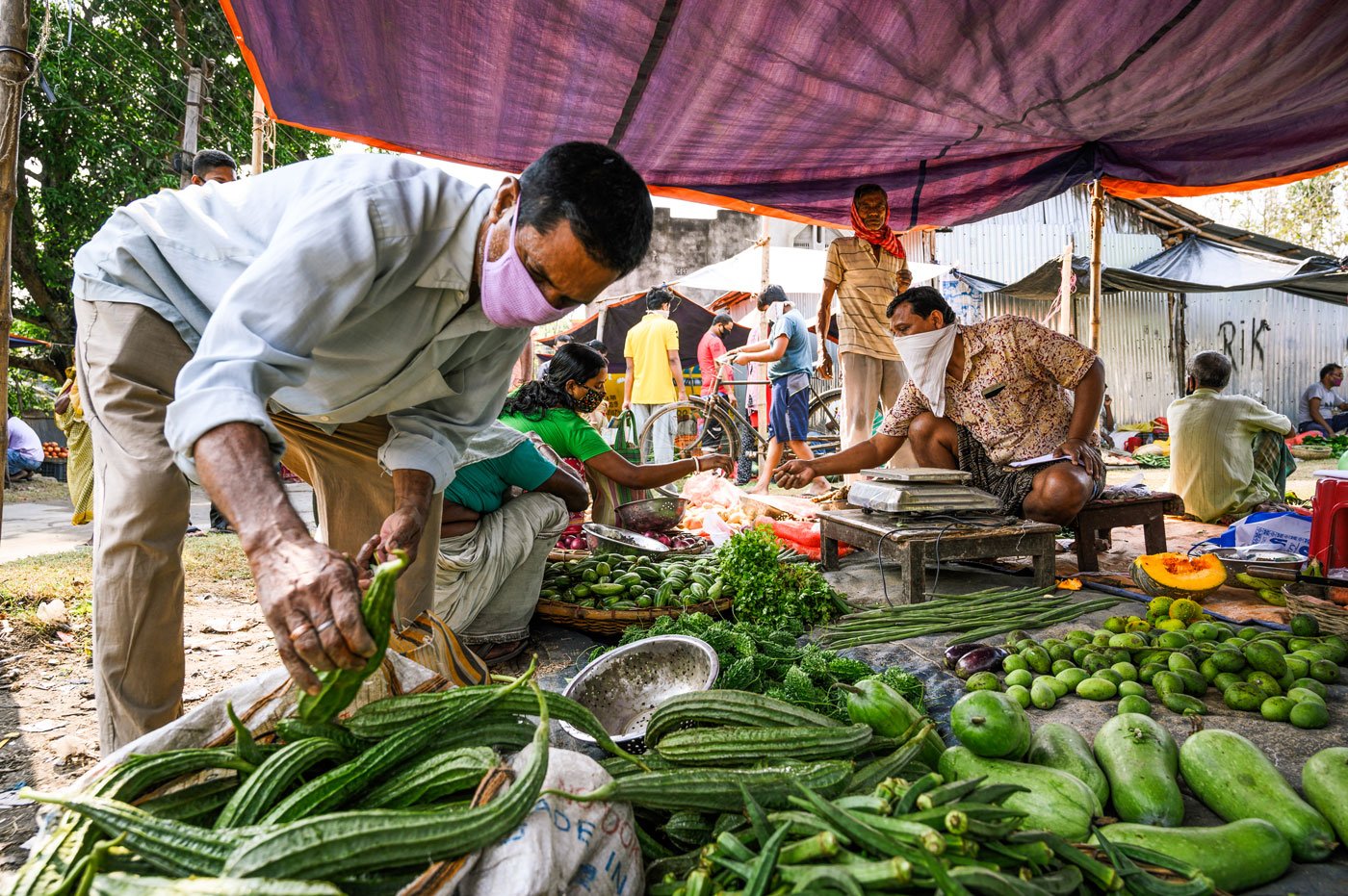
ଗ୍ରାହକମାନେ ପରିମଳ ଦଲାଲ୍ଙ୍କ ଷ୍ଟଲରୁ ପରିବା ନେଉଛନ୍ତି । ୩୦ ବର୍ଷ ଧରି ଏହି କାମ କରିବା ପରେ, ୫୧ ବର୍ଷ ବୟସ୍କ ପରିମଳଙ୍କ ଆତ୍ମବିଶ୍ୱାସ ଆଜି ଅନ୍ୟମାନଙ୍କ ତୁଳନାରେ ଅଧିକ ରହିଛି ଓ ସେ କୁହନ୍ତି ଯେ “ ମୋର ବ୍ୟବସାୟରେ ଅଧିକ କିଛି ପରିବର୍ତ୍ତନ ଘଟିନି । ମୋର ପରିଚିତ ଗ୍ରାହକମାନେ ଏବେ ମଧ୍ୟ ଏଠାକୁ ଆସୁଛନ୍ତି’’ ।
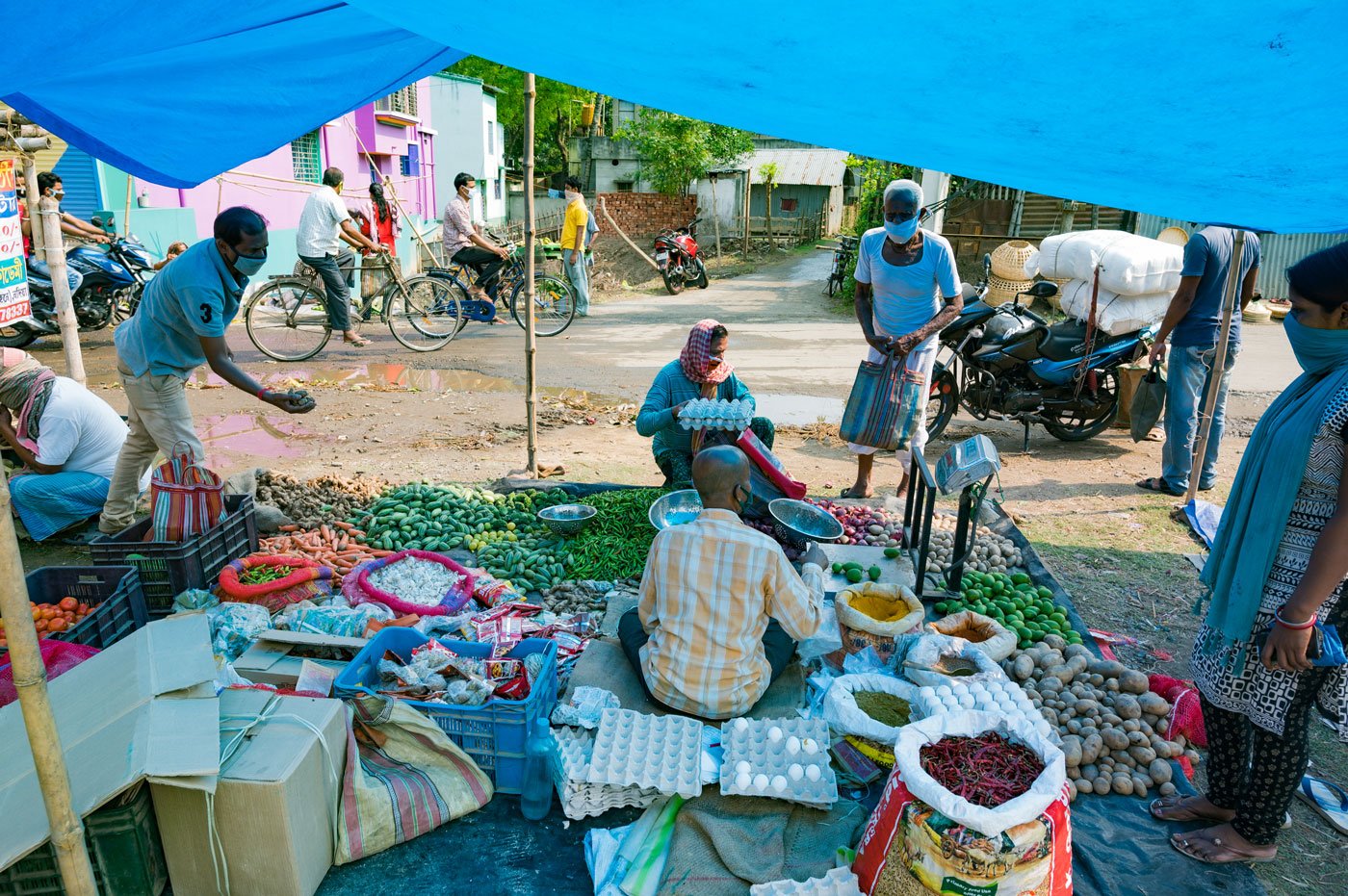
କାର୍ତ୍ତିକ ଦେବନାଥ ଅଣ୍ଡା, ଅଦା, ପିଆଜ, ଲଙ୍କା, ରସୁଣ ଓ ଅନ୍ୟାନ୍ୟ ପନିପରିବା ବିକ୍ରି କରନ୍ତି । ତାଙ୍କର ବୟସ ହେଉଛି ୪୭ ବର୍ଷ ଓ ସେ ଗତ ତିନି ଦଶନ୍ଧି ହେବ ଏହି ବ୍ୟବସାୟ କରି ଆସୁଛନ୍ତି । “ମୋର ବ୍ୟବସାୟ ଭଲ ହେଉଛି, ଏପରିକି କିଛି ନୂଆ କ୍ରେତା ମଧ୍ୟ ଯୋଡି ହୋଇଯାଇଛନ୍ତି” ବୋଲି ସେ କୁହନ୍ତି ।
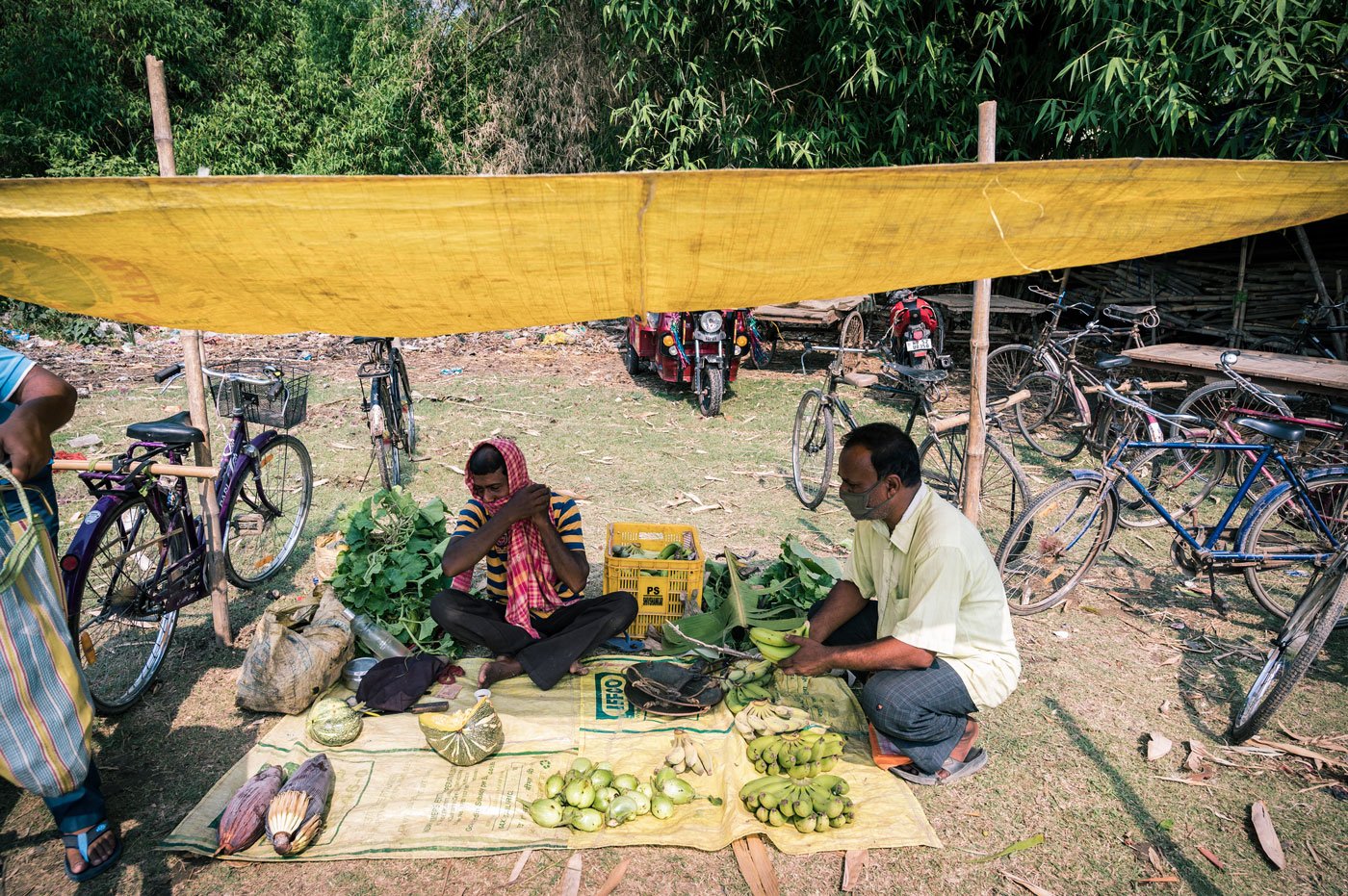
କୃଷକ ଓ ପାର୍ଟଟାଇମ୍ ପନିପରିବା ବିକାଳି ୩୭ ବର୍ଷ ବୟସ୍କ ବାବୁ ଶେଖଙ୍କ ପରି ଅନେକ କାମଚଳା ମାସ୍କ ବ୍ୟବହାର କରୁଛନ୍ତି, ଯେପରିକି ଏକ ଗାମୁଛା ଯାହା ଶେଖ ବ୍ୟବହାର କରନ୍ତି ।
![Left: Khakon Pramanick, 45, who sells chickens and sometimes migrates to other states to work at construction sites, is now struggling with a drop from both sources of income. Right: Bharat Halder, 62, was a mason’s helper before he started selling fish around three years ago, hoping to earn more. During the lockdown, his earnings have dropped from around Rs. 250 a day to less that Rs. 200, he says. The supply of fish is also uncertain. “Fish is no longer coming from Andhra Pradesh due to the lockdown,” he says. “So the local pond and river fish [in smaller quantities] are now sold here.”](/media/images/09a-_DSC0045.max-1400x1120.jpg)
![Left: Khakon Pramanick, 45, who sells chickens and sometimes migrates to other states to work at construction sites, is now struggling with a drop from both sources of income. Right: Bharat Halder, 62, was a mason’s helper before he started selling fish around three years ago, hoping to earn more. During the lockdown, his earnings have dropped from around Rs. 250 a day to less that Rs. 200, he says. The supply of fish is also uncertain. “Fish is no longer coming from Andhra Pradesh due to the lockdown,” he says. “So the local pond and river fish [in smaller quantities] are now sold here.”](/media/images/09b-_DSC9999-2.max-1400x1120.jpg)
ବାମ : ଖକୋନ ପ୍ରମାଣିକ, ୪୫, ଯିଏ କୁକୁଡା ବିକ୍ରି କରନ୍ତି ଓ ବେଳେବେଳେ ନିର୍ମାଣ ସ୍ଥଳିଗୁଡିରେ କାମ କରିବା ପାଇଁ ଅନ୍ୟ ରାଜ୍ୟଗୁଡିକୁ ଯାଆନ୍ତି, ବର୍ତ୍ତମାନ ଉଭୟ ସୁତ୍ରରୁ ତାଙ୍କର ରୋଜଗାର ହାର ହ୍ରାସ ପାଇଛି । ଡାହାଣ: ଭରତ ହଲ୍ଦର, ୬୨, ତିନି ବର୍ଷ ପୂର୍ବେ ଅଧିକ ରୋଜଗାର ହେବା ଆଶାରେ ମାଛି ବିକ୍ରି ଆରମ୍ଭ କରିବା ପୂର୍ବରୁ ମିସ୍ତ୍ରୀମାନଙ୍କ ସହାୟକ ଭାବେ କାମ କରୁଥିଲେ। ତାଲାବନ୍ଦ ସମୟରେ ତାଙ୍କର ଦୈନିକ ରୋଜଗାର ୨୫୦ଟଙ୍କାରୁ ହ୍ରାସ ପାଇ ୨୦୦ଟଙ୍କା ହୋଇଯାଇଛି,” ବୋଲି ସେ କୁହନ୍ତି । ମାଛ ଯୋଗାଣ ନେଇ ମଧ୍ୟ ଅନିଶ୍ଚିତତା ରହୁଛି । “ତାଲାବନ୍ଦ ଯୋଗୁଁ ଆନ୍ଧ୍ରରୁ ଆଉ ମାଛ ଆସୁନି,” ବୋଲି ସେ କୁହନ୍ତି । “ଏଣୁ ବର୍ତ୍ତମାନ ଏଠାରେ ସ୍ଥାନୀୟ ପୋଖରୀ ଓ ନଦୀର ମାଛ ବିକ୍ରି କରାଯାଉଛି [ ଅଳ୍ପ ପରିମାଣରେ]” ।
![Sridam Mondal, 62, mainly sells bananas and, at times, also a few vegetables. “The sales are very low [during the lockdown],” he says.](/media/images/10-_DSC9985.max-1400x1120.jpg)
ଶ୍ରୀଦାମ ମଣ୍ଡଳ, ୬୨, ମୁଖ୍ୟତଃ କଦଳୀ ବିକ୍ରି କରନ୍ତି ଓ ବେଳେବେଳେ କିଛି ପନିପରିବା ମଧ୍ୟ ବିକ୍ରି କରିଥଆନ୍ତି । “ବିକ୍ରି ହାର ବହୁତ କମ୍ (ତାଲାବନ୍ଦ ସମୟରେ),” ବୋଲି ସେ କୁହନ୍ତି ।
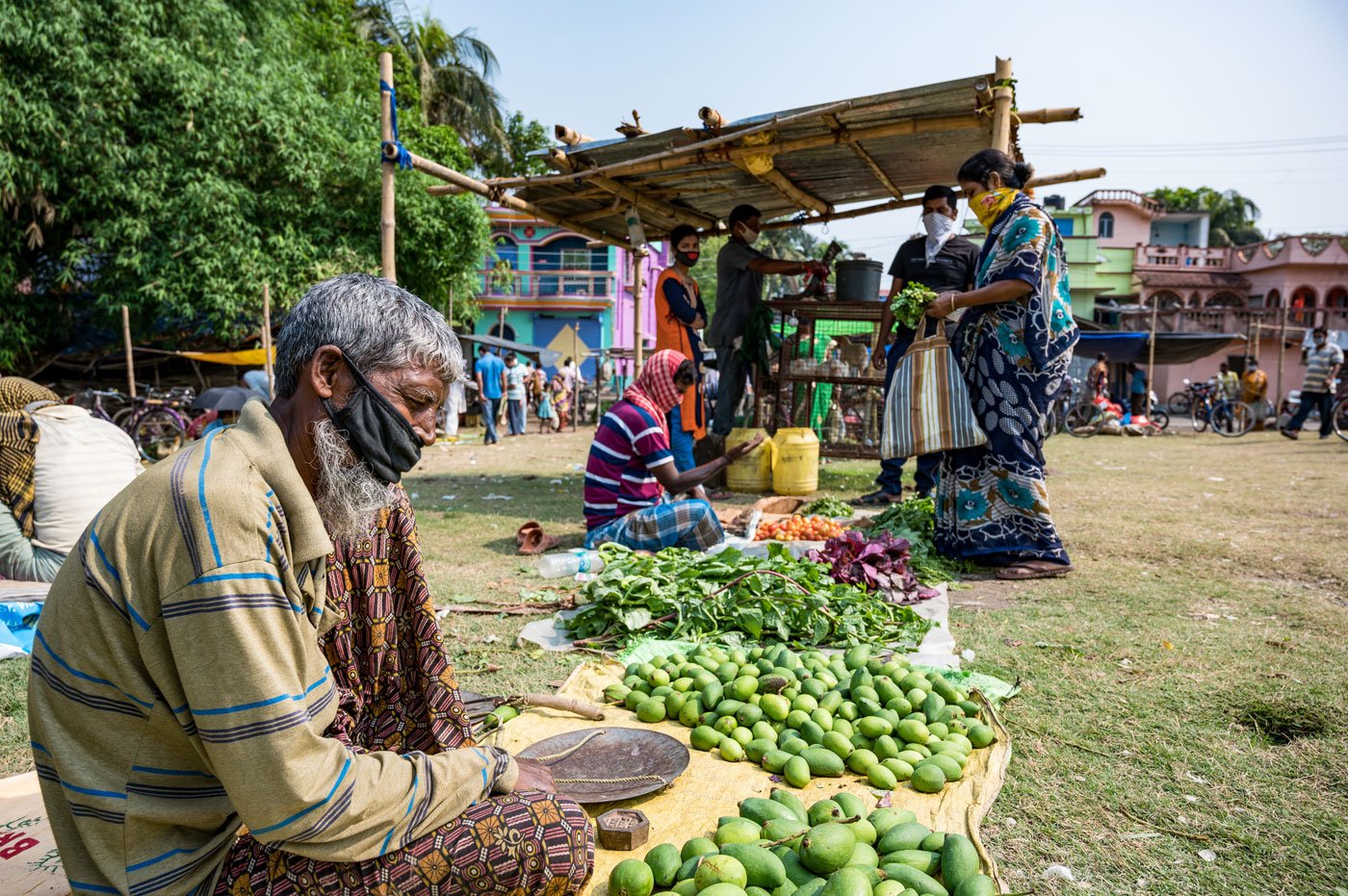
ସାଧୁ ଶେଖ, ୫୬, ପଡିଆ ବାହାରେ ଏକ ସ୍ଥାନ ପାଇଯାଇଛନ୍ତି, ଅନ୍ୟ ବିକାଳିମାନେ ବସୁଥିବା ସ୍ଥାନ ଠାରୁ କିଛି ଦୂରରେ। ସେ ସେଠାରେ ନିଜ ଚାଷଜମିରେ ହୋଇଥିବା ଆମ୍ବ ଓ ପନିପରିବାଗୁଡିକ ବିକ୍ରି କରନ୍ତି ।
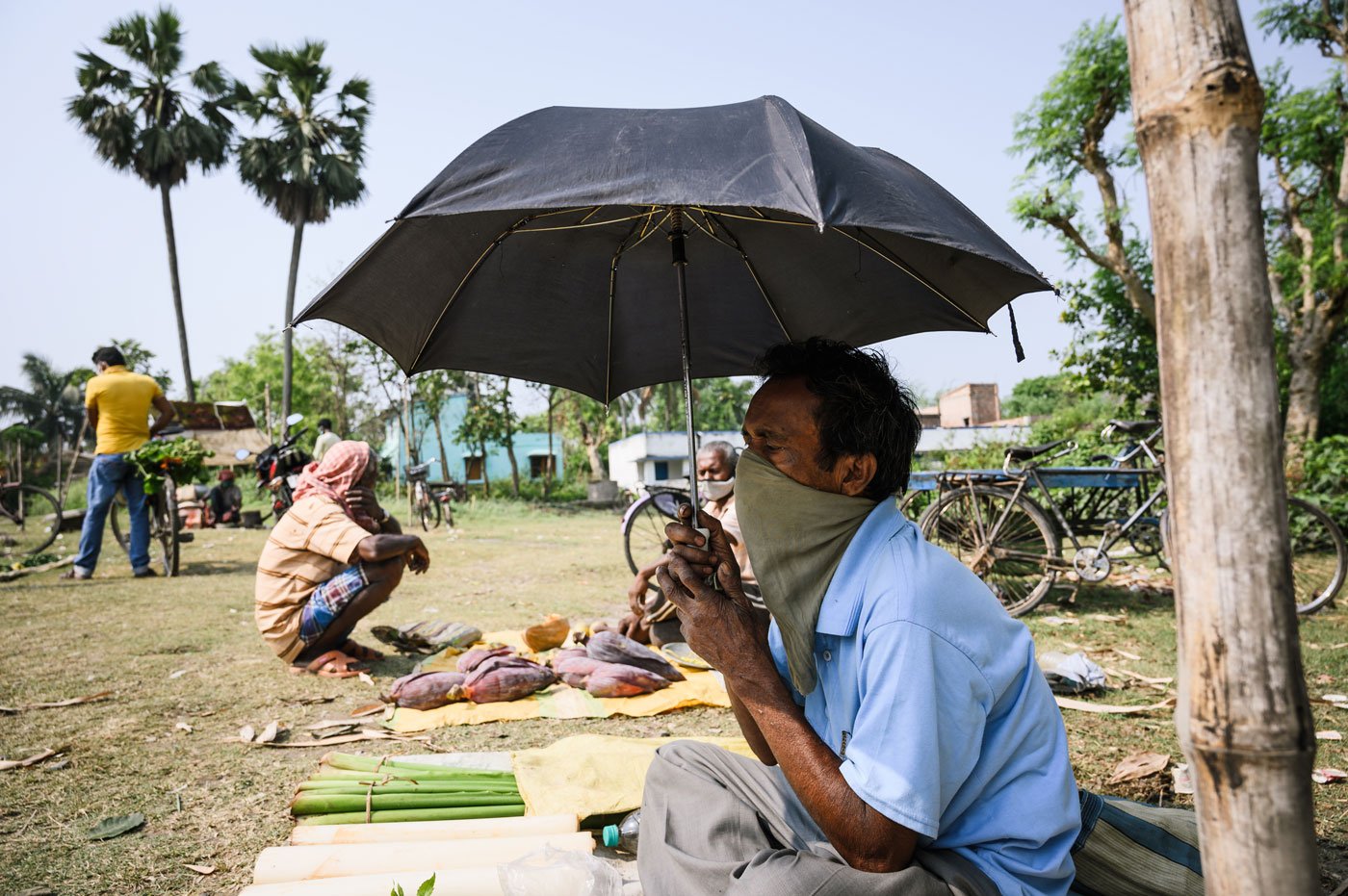
ସୂର୍ଯ୍ୟ କିରଣରୁ ରକ୍ଷା ପାଇବା ପାଇଁ ଏକ ଅସ୍ଥାୟୀ ଛାତ ଭାବେ ବ୍ୟବହାର କରିବାକୁ ଖଣ୍ଡିଏ ପ୍ଲାଷ୍ଚିକ୍ ସିଟ୍ ନଥିବାରୁ, ସଦାନନ୍ଦ ରାୟ, ୫୮, କିଛି ପନିପରିବା ସହିତ ପଡିଆ ମଝିରେ ଏକ ଛତା ଧରି ବସୁଛନ୍ତି । ସେ ଦିଲ୍ଲୀରେ ଘରୋଇ ସହାୟକ ଭାବେ କାମ କରୁଥିଲେ କିନ୍ତୁ ତାଲାବନ୍ଦର କିଛି ଦିନ ପୂର୍ବରୁ ଘରକୁ ଆସିଥିଲେ । ବର୍ତ୍ତମାନ ତାଙ୍କ ଆୟର ଏକମାତ୍ର ସ୍ରୋତ ହେଉଛି ପରିବା ବିକ୍ରି କରିବା, ଯେଉଁଥିରୁ ସେ ଦିନକୁ ୫୦-୧୦୦ଟଙ୍କା ରୋଜଗାର କରନ୍ତି । “ମୋ ପାଖରେ ସବୁଦିନ ବିକ୍ରି କରିବାକୁ ପରିବା ନଥାଏ, ଏଣୁ ମୁଁ ନିୟମିତ ଏଠାକୁ ଆସେନାହିଁ” ବୋଲି ସେ କହୁନ୍ତି । “ଭବିଷ୍ୟତରେ କ’ଣ ହେବ ତାହା ମୁଁ ଜାଣିନି” ବୋଲି ମଧ୍ୟ ସେ କୁହନ୍ତି।
ଅନୁବାଦ: ଓଡ଼ିଶାଲାଇଭ୍
